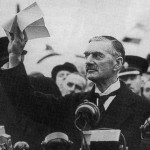I apologize in advance for the blatantly political tone of this piece but I am flabbergasted by what I see happening on the eastern periphery of Europe and the anemic reaction to state on state aggression by the rest of the world.
I read this piece by Justin Logan from the Cato Institute this morning and was struck immediately on how similar in tone this piece is to the rhetoric of the pre-WWII America Firsters. Is Estonia Worth a War?
I just ask myself are people so blind or so willing to seek peace at any cost that they will not stand up to tyranny until the cost of stopping it is orders of magnitude greater than if they had stood up for principle at the beginning? The same kinds of arguments against involvement in WWII were made by isolationists in the US and appeasers abroad as Hitler’s Germany slowly re-armed and swallowed its neighbors in the years prior to WWII.
Largely the same process is in action in Russia today. Whereas Germany felt slighted and unjustly treated after WWI modern Russia feels slighted and mistreated after the unsatisfactory (from their perspective) end to the Cold War. It is interesting that roughly a generation passed between 1918 and 1939 and roughly a generation has passed between 1989 and 2014. Russia was stripped of large swaths of territory in the wake of the fall of communism and Germany was stripped of territory, actually split into two separate blocks by the Danzig Corridor, in the wake of Versailles. The German people felt they were not defeated, (hence the popularity of the stab in the back myth), while many Russians today feel that they were betrayed from within by Gorbachev and Co. Hitler was an ideologue that fed on and amplified public perceptions of being unjustly handled by the Allies and Putin has done the same in Russia. As Germany expanded it was only weakly opposed by the Allied powers and we are seeing the same sort of reaction in the West to Putin’s actions.
History seems to be repeating itself before our eyes as yet another European ideologue and dictator forges ahead towards war and an attempt to dominate its neighbors. Is the West going to stand idly by and allow it to happen again until the cost of stopping it is immeasurably higher? The stakes are higher this time around because Russia is a nuclear power. The time to stop Putin and Russia is now and a serious demonstration of Western resolve would achieve without bloodshed what will costs thousands, if not millions of lives later on.
Has the West learned nothing from history other than that War is bad? There are things worse than war, and if the Western leadership does not find their spine soon they will see what those things are.

